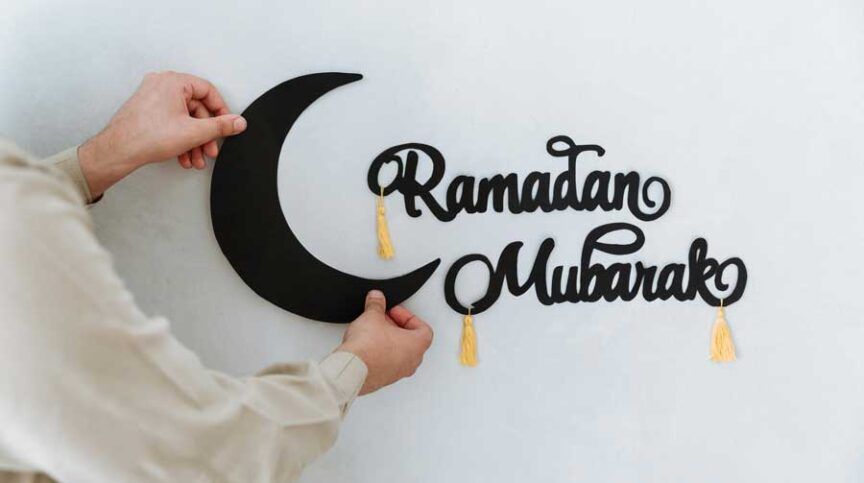I couldn’t keep count of the times that I “got help” on a test. Whether it came through reaching out to a friend or a family member who had already taken the class or watching hours upon hours of Khan Academy videos. In a similar vein, I’ve received help on the test that is our dunya. Reaching out to imams with my questions, carving out time in my day to pray, sitting inside during recess because I was fasting, and it was 100 degrees outside — these are all examples of getting help on my worldly tests. We don’t look down on someone for taking extra time to complete their tasks or taking naps during Ramadan. Why would we? Muslims (and those who work with us) understand that while fasting is an important tenet of our faith, it is a physically taxing form of worship and accommodations are made accordingly. After all, Allah would never burden us with more than we can bear.
Why then, do we view our mental health challenges so differently? We don’t question why someone is going to see their doctor. Maybe they’re sick and need to get treatment, or maybe they are just going in for a check-up to make sure everything is fine with their physical health. Why then, do we stigmatize the utilizing of mental health resources? If someone is getting therapy, “it must be because they are crazy,” whisper some in the community, “something is wrong with them.” This stigma about reaching out for mental health services has drastic effects on mental health outcomes. A 2021 survey by Rania Awaad, et al. found that Muslim Americans reported a lifetime suicide attempt rate 2.18 times higher than other religious groups. Depression has been prevalent in our community while there remains an underutilization of mental health resources.
This Dunya Is a Test
This life is a test. Something we, as Muslims, hear very often, but it is something that rings true at every juncture. Things are going to happen in your life that will stress you out, things will not always go your way. These tests from Allah are meant to strengthen your eman, and they are not more than you can bear (see Quran 2:286). When a test comes however, we are encouraged to turn to Allah to ask for help to overcome our hardship. We can also reach out to our friends and family for help. If your car were to break down, you may ask your spouse to drive you to work. If you were to be bedridden with an illness, perhaps your neighbor sends a warm meal to you. As a community, we should take the same approach to the times that our mental health is tested by adversity or hardship. If you are experiencing severe anxiety and dread regarding a job interview, you can reach out to a therapist to help you learn healthy coping mechanisms. If a loved one were to pass away and your grief consumes you and does not lessen over time, you can seek out a therapist and talk through your grief. “Better out than in” is some of the best advice from a children’s movie I’ve ever received. Shrek, the large green ogre, said this in reference to his burps, but it rings true for our emotions as well. If we hold them in and ruminate on them without engaging healthy coping skills, we can make ourselves worse and suffer more.
Be Kind to Yourself
When we’re traveling, we are allowed to shorten our prayers to ease the hardship. Why not treat our mental health the same way? When we’re struggling with depression, give ourselves extra time to complete our tasks. Focus on the small wins, as these small wins can foster hope and a positive outlook, and they can add up to a large win in the future. Don’t beat yourself up because you slept through fajr, but instead focus on the fact that you were able to pray dhuhr. Being kind to yourself and recognizing your shortcomings while celebrating your victories is the way of the Prophet (s). “The most beloved of deeds to Allah are those that are most consistent, even if it is small” (Bukhari). Being kind to yourself naturally extends to others, so celebrate their small wins with them, and make 70 excuses for the shortcomings of your brother or sister in Islam. We do not know the tests they are dealing with at any given time. We should not only overcome the community stigma surrounding seeking out mental health resources, but we should also actively encourage our fellow Muslims to seek help when they are overwhelmed with their burdens.
Have you ever had a secret that you just had to tell someone? Did it not feel good to finally get it off your chest? Talking about things lets us hear ourselves out loud, but also may give us new perspectives from another person, ways of looking at a situation that we may not have considered. It may also take away from the mystery and negative power of our struggles.
Changing Perceptions
We should change the way we perceive mental health resources. They are not a last-ditch effort that we utilize during a crisis to stabilize ourselves, and then never utilize again. Most times we do not simply end up driving off a cliff, as there are numerous “road ends ahead” signs along the way. If we engage with mental health resources and use them as a form of maintenance, then we may be able to avoid swerving off the road altogether. Seeking help from Allah SWT, talking to a trusted family member or friend, consulting with the community imam, or speaking with a mental health professional — all of these can help during times of stress. There are many self-help mental health resources available online as well, if one is hesitant to reach out to a therapist. Maintenance is key, and starting with the basics makes sense. So, we should try to eat healthy, drink lots of water, exercise regularly, prioritize a regular sleep pattern, learn relaxation techniques, develop our goal-setting skills, and practice gratitude to Allah SWT; these skills, and so many more, are techniques for maintaining and increasing our mental health.
Yet, when issues seem too burdensome to overcome by talking to a trusted person in your life or by applying self-help strategies, seeking out a therapist makes perfect sense. Some Muslims may feel that talking about their issues with a therapist seems like complaining, but if you understand that by talking about our issues, we are working towards a solution, then it isn’t complaining at all, it is working towards a solution.
If there were an easy solution to all mental health challenges, the epidemic of stressed and burdened individuals in our communities would have been resolved already, but this issue is multi-faceted. Change in the attitudes and perspectives of a community does not happen overnight, and in our community, it may not happen as fast as we would hope. What each of us can do is make change in ourselves. What’s stopping you from strengthening your coping skills or becoming more aware of your inner dialogue to see if your focus is too often negative? What is stopping you from going to therapy if that is what is needed? Talk about mental health — with your friends, with your families, and within community circles. Make sure those around you know that there won’t be any negative judgement from your side if they see a therapist.
Finally, remember, there is no shame in reaching out for help. Allah SWT makes concessions for us to make our burdens easier to bear. Seeking out therapy is another way to make your mental health burden easier to bear, and as a way to widen our perspective, increase our self-awareness, and develop positive coping skills. It is our responsibility to change our hearts and minds, to feel compassion for ourselves and others when they are suffering, and to care for our community. And when each of us softens his or her heart, the community as a whole will soften its heart. This life is a test, that is true, but it is also a blessing. Tests will come, but we have been given the roadmap, the compass, and the provisions with which we can navigate through them.




